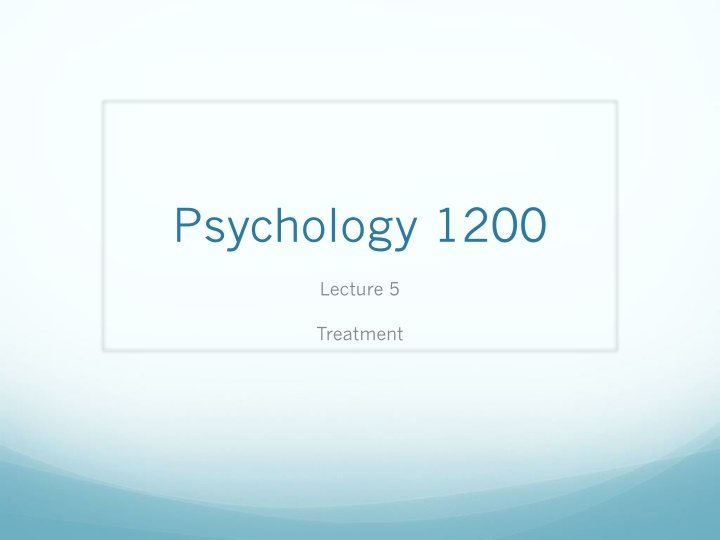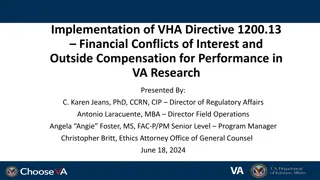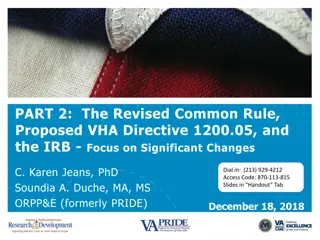
Treatment in Psychology: Psychotherapy and Drugs
Delve into the world of mental disorder treatment options such as psychotherapy and drugs, exploring the nuances of therapy effectiveness, therapist training, and client-centered approaches in psychology.
Download Presentation

Please find below an Image/Link to download the presentation.
The content on the website is provided AS IS for your information and personal use only. It may not be sold, licensed, or shared on other websites without obtaining consent from the author. If you encounter any issues during the download, it is possible that the publisher has removed the file from their server.
You are allowed to download the files provided on this website for personal or commercial use, subject to the condition that they are used lawfully. All files are the property of their respective owners.
The content on the website is provided AS IS for your information and personal use only. It may not be sold, licensed, or shared on other websites without obtaining consent from the author.
E N D
Presentation Transcript
Psychology 1200 Lecture 5 Treatment
Definitions In the case of mental disorder there is: Psychotherapy Drugs Surgery Surgery is only the most severe cases and so we will restrict ourselves here to psychotherapy and drugs. Psychotherapy = a form of talking. Drugs = biochemical agents.
Psychotherapy Although the thing administered is talking, words and phrases spoken in conversation with one or more people, talking is not necessarily treatment. We do a great deal of talking that is not therapeutic in purpose. But does purpose/intent matter? What if talking with grandma over tea makes you feel better is that treatment? But then, even though we might intend to treat, we may not actually be treating. So, should we define psychotherapy based on the effect or the intent or something else?
Psychotherapy Perhaps the definition should be based upon the training of the therapist. Perhaps if your grandma is wise, has learned wisdom over years of experience in the world, wants to help you, does help you, but has no formal training in the methods and techniques of psychotherapy, she is not actually treating you. What if your priest, who does have formal education, helps you, are they treating you? So we have a helping vs treating problem. Interestingly, there is a school of psychotherapy, which I learned about and naively dismissed many years ago, in which all medical sounding language, including treatment is rejected.
Psychotherapy: Client Centered Therapy Developed between 1945 and 1955. Rooted in humanistic psychology. Entirely non-medical: Client not patient, human being not expert or doctor, acceptance not diagnosis of disorder, etc. Rooted in empathy, perspective, culture, compassion, context, non-judgmental, constructive. Very much like the difference between evaluation and feedback in personnel surveys. It s not as if there have been no approaches other than demon possession and the medical, treatment-oriented model. We could give a child with ADHD drugs, or we could remove them from school, sell the city house and buy a farm! One is treatment, the other is ..?
Treatment Again As soon as we use the word, a cascade of assumptions and presumptions about what to do next follows. As soon as we say HAS ADHD , it sounds like we are talking about a well-defined, localized, internal, pathological condition. Methodological individualism is the practice of locating problems an individual suffers or faces in their life as located within the individual. Cancer is located within the individual, but depression is not. Human psychological states are dispositions and so not located anywhere! So why then do we act as if psychological states are the same as medical conditions?
Medicine and Society Medicine is generally positively perceived. An association with medicine then encourages positive interpretations. Medicine is amoral. There is little blame or shame in being given a medical diagnosis. There is a clear opportunity for profit within the medical domain. Medicine is scalable talking with someone is not. Medicine is related to science, can be viewed as evidence- based . Medicine is modern, technological, sophisticated and advanced .talking has always existed. There is an immediate, direct, clear relationship between medical interventions and cure. But talking, reflecting, considering takes time and commitment. We are required to change ourselves, to accept responsibility, etc.
Medicine and Society There is a generally accepted distinction between the expert , the doctor, and the ignorant, the patient. The taking of a drug to treat a condition is generally accepted, but the taking of advice to make life better is often questioned, ignored, dismissed. Efficacy of a drug is not rooted in individual opinion, perspective or point of view. Efficacy of a life strategy is deeply related to perspective, morality, individual purpose, etc.
Medicine and Culture Acceptance of drug taking to treat medical conditions is partly cultural. So is acceptance of drug taking for non-medical conditions. We live in a culture of drug acceptance. The leap from a coffee to stay alert or a drink to relax to a pill to stay happier or less anxious is not as large if we are fully culturally accepting of drug taking. The legalization of drugs and reduction in drug enforcement is another signal of a culture that is broadly accepting of drug taking. So the transition to a medical model for treating psychological states and conditions is related to our social and cultural attitudes towards medicine and drug taking.
Back To Psychotherapy But psychologists are not legally permitted to prescribe drugs in Canada. In psychology we talk, we do not drug. In some sense, I have suggested that the deck is somewhat stacked against psychologists in our current culture. It seems to most that a drug-related alternative is better for the reasons we have covered above. So, is this right? Should we pack up and go home? Or perhaps the drug culture and medical model are doing damage.
The Problem Or perhaps you think what most people think . Since we can't really decide or make the case one way or another, let s just argue that some combination of psychotherapy and drug taking is the best. So .what does the evidence say?
The TalkSome Things to Know Before Watching Placebo a treatment with no active ingredient. Clinical trial .experiment in which subjects are randomly assigned to drug vs no drug/placebo. Meta Analysis .an analysis of a group of papers about the same question. Moderate vs severe depression .severe depression is incapacitating. One can not function at work or school with severe depression. Anecdotal evidence evidence based on personal experience. FDA .US national, government drug regulation agency.
Takeaways Placebos work well, nearly as well as drugs overall. Very small percent of depressed people benefit from antidepressant drugs. Size of benefit is small. Most drugs have similar effects. FDA trials biased towards demonstrating drug effect. Talk mirrors how science works. Back and forth, skepticism, careful, evidence oriented. Responsible researchers do not accept the serotonin theory of depression. Marketers do.
Takeaways Depression drugs have side effects. Stroke, sexual dysfunction, suicide, hypertension, etc. 30-50% of patients experience withdrawal symptoms from discontinuing depression drugs. There is an increased risk of relapse (experiencing depression again after improving) after taking depression drugs. Placebos work EVEN WHEN you tell patients you are giving them placebos! Trust is fundamental to clinical efficacy; trust must be earned and must not be violated. Psychotherapy alone works as well as antidepressant medication overall. Exercise works as well as psychotherapy.
Takeaways Guideline for treatment when treatments are roughly equally effective, we should prescribe the safest and best tolerated. Exercise and psychotherapy are safest and best tolerated for the majority of people. So the 64 million dollar question why are these drugs prescribed and taken so heavily?
Over Diagnosis and Over Treatment Discussion 5 How does over-diagnosis and over-treatment happen? Find examples from the internet, post your examples. Consider i) Conflicts of interest. ii) Political/social/cultural pressure to treat. iii) Patient demands/expectations. iv) Influence of pharmaceutical industry interests in science and health care.
Discussion Question 5: Resources You are going to need some guidance on this question it s a big one. The following are some links to valuable resources. Check them out, ask about them and incorporate them into your discussion. i) https://www.youtube.com/watch?v=yuCwVnzSjWA&t=988s Allen Frances on overdiagnosis ii) Allen Frances on the pharmaceutical industry https://www.youtube.com/watch?v=THI9dc496fc iii) John Campbell on funding of regulatory agencies https://www.youtube.com/watch?v=05GGaCBk9Mo&t=804s iv) Paul Glasziou on overdiagnosis and over treatment https://www.youtube.com/watch?v=Yoy4CBLgxmc v) Iona Heath https://www.youtube.com/watch?v=Vv92ssc2snc






